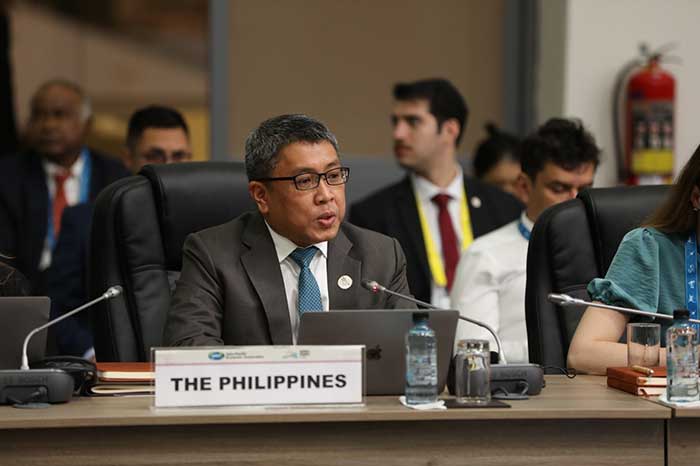
By Francis Allan L. Angelo
The Philippines has called for enhanced collaboration among Asia-Pacific Economic Cooperation (APEC) economies to address current challenges and revitalize the multilateral trading system.
The appeal was made by Department of Trade and Industry (DTI) Undersecretary Allan Gepty, who represented Secretary Fred Pascual at the APEC Ministers Responsible for Trade (MRT) meeting held from May 17 to 18 in Arequipa, Peru.
Themed “Empower. Include. Grow.,” the meeting focused on fostering deeper economic and technical cooperation to boost prosperity and well-being across the Asia-Pacific region.
During discussions on trade liberalization and the outcomes of the 13th World Trade Organization (WTO) Ministerial Conference, Undersecretary Gepty highlighted the importance of collaboration despite the unmet outcomes.
“While we did not achieve the outcomes we had hoped for, the Philippines sees this as an opportunity for us to reflect and collaborate more to strengthen the multilateral trading system,” Gepty said in a press statement.
Gepty emphasized the need to build on the positive outcomes of the WTO Ministerial Conference by implementing and advancing the decisions and agreements made. “The Philippines reaffirms its commitment to upholding the WTO’s role in fostering a rules-based, non-discriminatory, free, open, fair, transparent, and inclusive multilateral trading system,” he added, stressing the urgency to address outstanding issues within the WTO.
Philippine Priorities in APEC
Gepty underscored agriculture as a priority for the Philippines, urging APEC economies to engage constructively to resolve domestic support and public stockholding issues. He suggested exploring alternative approaches for further discussion, recognizing this as a new subject in APEC.
The Philippines also championed the integration of broader segments into trade, advocating for greater inclusion of micro, small, and medium enterprises (MSMEs), women, persons with disabilities, and the youth and elderly.
Meanwhile, during the first-ever Joint Women and Trade Ministers’ Meeting, DTI Undersecretary Carol Sanchez joined Gepty in sharing the Philippines’ policies and programs aimed at empowering women entrepreneurs in the digital economy.
These initiatives focus on training, e-commerce, digital marketing, technology access, and financing.
Roadmap for Economic Integration
Addressing informality is a key priority under Peru’s 2024 APEC chairmanship. Member economies are collaborating on a roadmap to facilitate the transition to the formal and global economy, including capacity-building and skill development programs, set to be finalized before the November APEC Leaders’ Summit.
APEC Trade Ministers also discussed the Free Trade Area of the Asia-Pacific (FTAAP), a concept advocated by APEC’s Business Advisory Council.
“With the current global economic setting, coupled with many challenges and fast-paced advancement of technology, FTAAP should be viewed more in the context of regional cooperation and economic integration that facilitates not only trade but creates more opportunities for our people under an environment that is fair and fosters inclusive growth and development,” Gepty remarked.
On the sidelines of the ministerial meeting, Undersecretary Gepty engaged with officials from Chile, Canada, and the United Kingdom to discuss plans for deeper bilateral trade and investment cooperation.
The APEC trade ministers concluded the meeting with a statement reaffirming APEC’s commitment to promoting inclusive and interconnected trade and investment across the Asia-Pacific region.




















